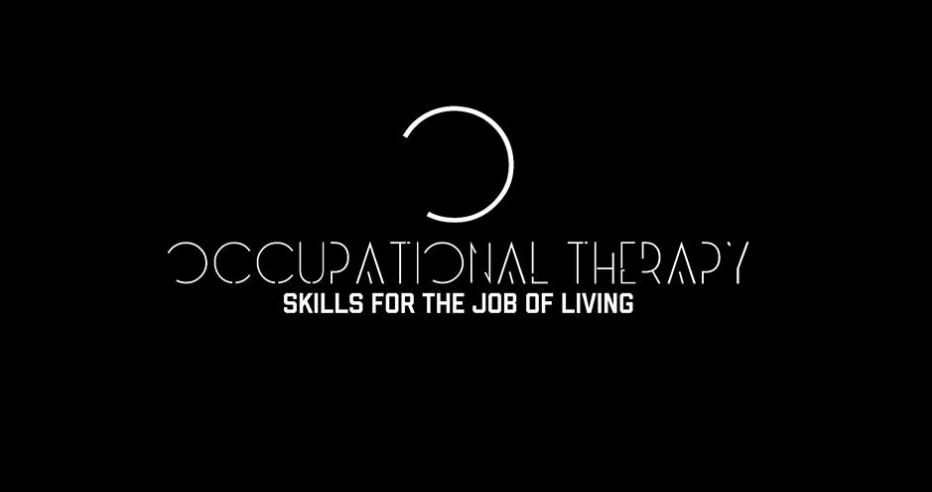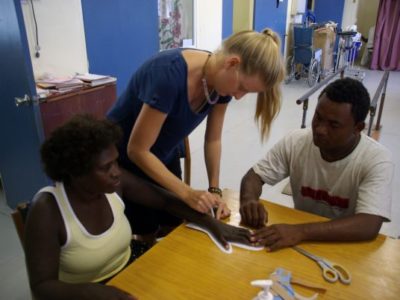Looking for a career in the medical field where you can still think creatively and use your left brain? Occupational therapy blends together science and art in a way that helps people function optimally. In the field or in the office, therapists work one-on-one with patients of all ages to assist them in activities of daily living or developing certain necessary skills. Occupational therapy is all about enabling patients to reach their full capacity, whether in their job or in their everyday life. Has this career piqued your interest yet?
Find out what it takes to become an occupational therapist.
What does an OT actually do?

Occupational therapists help improve the way the nervous system functions, so a patient can develop more advanced motor, social or vocational skills. ” I like getting to work with people on facilitating independence or at least to improve their ability to participate in work, school, leisure activities, and just life in general,” OT Clinical Assistant Professor at UF Linda Struckmeyer said. An OT acquires the responsibility of either accommodating the patient’s environment or teaching the patient how to function independently. They can help a child work on their handwriting skills or teach an elderly person with arthritis how to drive. Occupational therapy exists to help people reach their full potential, and the rewarding feeling of helping someone improve functionality is why OTs generally love what they do.
What does it take to become an OT?
Like any career in the medical field, OT school requires tons of science classes, like anatomy, biology and psychology, to name a few. Of course, the amount of science classes needed varies depending on the program, but you will be an expert in the human body when you are done, regardless of if you opt for skeletal functions or muscular biology. OT school also requires a certain number of volunteer hours at different hospitals and clinics, which can range from around 30 to 100, but most students enjoy their time in the field. Once you have accomplished that, you will receive either a master’s degree or a doctorate that will allow you to find a job and begin practicing.
What should you know about becoming an OT?
1. What is my expected income?
According to Forbes, the median annual income for an occupational therapist is $75,000. Obviously, this will vary depending on where and how often you work. Most OTs choose this career for the job satisfaction, not the money, but it definitely provides a comfortable lifestyle. It’s true that if you love what you do, you’ll never work a day in your life; if you can make money doing what you love, that’s a win-win.
2. How much will I work?
Occupational therapy can be a highly flexible job. Therapists generally work 9 to 5 but can also decide their own level of commitment. Unlike ER doctors, no one ever goes to therapy for an emergency, so their days tend to err on the side of relaxed, rather than high stakes and stressful.
3. Are OTs in high demand?
The short answer: YES. There will always be a need for OTs no matter where you live. OTs tend to work in hospitals or outpatient clinics, but you can also find them in schools and daycares, universities and long-term nursing facilities, to name a few. You’ll have dozens of specialties to choose from, which provides a vast range of places to work.
4. What is the work environment like?
“There tends to be a similar personality among a lot of OTs. The people, and even the bosses, are typically super compassionate and willing to communicate with you,” OT school grad from University of Florida Courtney Stephen. Occupational therapy is a unique part of the medical field because it’s competitive but also full of people who live for helping others reach their full potential. This translates into not only assisting patients, but helping coworkers and employees too – oh, and even assisting new grads looking for jobs.
Skills you need to become an OT
1. Creativity
People who work in medicine often joke that OT is the artistic side of the medical field. Medicine is very objective, but with OT, there is really no right or wrong as long as you’re reaching the goal. You also have to be “client–centered” and find what activities will interest the patient so they can find internal motivation that will lead them to success. “I did crafts, which I enjoy and still incorporate in treatment if the client likes that,” Struckmeyer said. She also recommends cooking as a great activity of daily living for patients to work on.
2. Customer Service
Nowadays healthcare workers in any field need to have good interpersonal skills and love helping people. OT itself centers around helping people reach their full capacity, and you have to be passionate about helping people in order to succeed in this field. “I worked as a Personal Care Associate at a retirement community, which gave me a chance to grow in patient care and communication,” a former OT student at Messiah College Laura Sollenberger shared about her volunteer experience.
3. Patience
Without patience, you won’t make it far as an OT. Depending on the injury or issue, some patients will need weeks or months of therapy, and it might be a while before you see any improvements. The exercises might seem repetitive, but if you aren’t patient, how can you expect the patient to have a hope of improving?
Advice for Aspiring OTs
“It’s easier to do hard things if you have a vision beyond the moment. It’s hard and there’s a lot of things I said no to socially because I had to study, but I felt like it would be selfish for me to quit…I studied so that I would have a shot at benefiting people in the future.” – Courtney Stephen, Occupational Therapist at The Orthopedic Institute and University of Florida graduate
“If you know you want to do OT, but you haven’t found the right setting, don’t stop searching. There are so many job opportunities and places to use your skills that you wouldn’t expect.” – Matthew Warren, Occupational Therapy student at New York University
“If you like to work with people, facilitate their independence and are flexible and adaptable, get in your volunteer observation hours in an OT clinic to make sure this is what you want to do.” – Linda Struckmeyer, Occupational Therapist and Clinical Assistant Professor at University of Florida



















